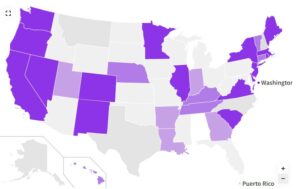Lactating parents who are away from their babies need to express milk (typically using a breast pump) on roughly the same schedule as the child’s feeding schedule to maintain their milk production and avoid health complications, which can be serious. This means that breastfeeding employees must be given lactation breaks every few hours throughout the workday and be allowed to use a clean, private space. By adopting breastfeeding-friendly policies, employers can ensure that they are in compliance with federal andstate laws, as well as improve employee retention and productivity, reduce the use of sick days, and lower health care and insurance costs.
Lactation Employment Laws
Employers are be required by various state and federal laws to provide break time, private space, and other reasonable  accommodations to breastfeeding employees. Most employees nationwide are covered by the PUMP Act, which requires employers to provide nursing employees with reasonable break time and a private, non-bathroom space for expressing breast milk during the workday. Employers may also be required to accommodate breastfeeding employees under other federal laws, including the Pregnant Workers Fairness Act, Pregnancy Discrimination Act and the Americans with Disabilities Act. Additionally, most states have their own break time and/or reasonable accommodation laws covering nursing workers.
accommodations to breastfeeding employees. Most employees nationwide are covered by the PUMP Act, which requires employers to provide nursing employees with reasonable break time and a private, non-bathroom space for expressing breast milk during the workday. Employers may also be required to accommodate breastfeeding employees under other federal laws, including the Pregnant Workers Fairness Act, Pregnancy Discrimination Act and the Americans with Disabilities Act. Additionally, most states have their own break time and/or reasonable accommodation laws covering nursing workers.






